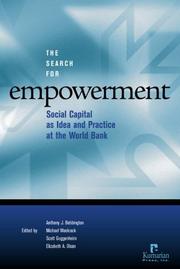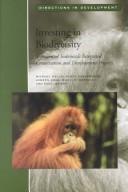| Listing 1 - 10 of 10 |
Sort by
|
Book
Year: 2021 Publisher: Washington, D.C. : The World Bank,
Abstract | Keywords | Export | Availability | Bookmark
 Loading...
Loading...Choose an application
- Reference Manager
- EndNote
- RefWorks (Direct export to RefWorks)
One of the big development challenges of the twentieth century has been defining the role that poor people, the subjects of development, could and should be playing in modern development. The author, a founding father of community-driven development at the World Bank Group, sets out a personal history of how he came to apply core concepts from anthropology, history, and sociology in pursuit of the moral project of finding ways to engage people not just as individual beneficiaries or targets for development, but as social and political beings whose institutions, priorities, values, and voice matter. Beginning with the Kecamatan Development Project in Indonesia (KDP), this essay charts the author's journey, starting with the puzzle of how to enable agency for villagers when someone else holds most of the power and all of the money. Indonesia's historical interest in rural development created an opening, but it was the 1998 political and economic crisis that cracked not just the Indonesian development model but also the World Bank's strictly technocratic approach to poverty. The essay then moves from community-driven development in Indonesia to developing a model that the World Bank could work with more broadly, and the technical, fiduciary, and bureaucratic innovations required throughout. The author reflects on the mainstreaming of community-driven development in the aftermath of KDP, describing the personalities and processes that presented both inspiration and hurdles along the way.
Book
Year: 2018 Publisher: Washington, D.C. : The World Bank,
Abstract | Keywords | Export | Availability | Bookmark
 Loading...
Loading...Choose an application
- Reference Manager
- EndNote
- RefWorks (Direct export to RefWorks)
Community-driven development is an approach to development that emphasizes community control over planning decisions and investment resources. Over the past decade, it has become a key operational strategy for many national governments, as well as for international aid agencies, with the World Bank alone currently supporting more than 190 active community-driven development projects in 78 countries. Community-driven development programs have proven to be particularly useful where government institutions are weak or under stress. This paper examines what the evidence shows about the utility of community-driven development programs for helping governments improve the lives and futures of the poor. The paper also addresses recent critiques of the community-driven development approach. The paper makes three main arguments. First, community-driven development offers governments a useful new tool for improving the lives of the poor. The empirical evidence from evaluations confirms that community-driven development programs provide much needed productive economic infrastructure and services at large scale, reasonable cost, and high quality. They also provide villagers, especially the disadvantaged, with a voice in how development funds are used to improve their welfare. Second, community-driven development programs are not a homogeneous category, and it is important to acknowledge the differences between national, on-budget, multi-year programs, and off-budget programs. And finally, community-driven development works best and achieves the greatest results when it is part of a broader development strategy that includes reforms to governance, investments in productivity, and integration with efforts to improve the quality of public service delivery.
Access of Poor to Social Services --- Citizen Engagement --- Communities and Human Settlements --- Community Development and Empowerment --- Community Driven Development --- Community-Driven Development --- Disability --- Economic Assistance --- Education --- Educational Sciences --- Health Care Services Industry --- Hydrology --- Impact Evaluations --- Industry --- Inequality --- Local Governance --- Macroeconomics and Economic Growth --- Poverty Reduction --- Public Service Delivery --- Rural Infrastructure --- Services and Transfers to Poor --- Social Development --- Social Protections and Labor --- Water Resources
Book
ISBN: 3030574261 3030574253 Year: 2021 Publisher: Springer Nature
Abstract | Keywords | Export | Availability | Bookmark
 Loading...
Loading...Choose an application
- Reference Manager
- EndNote
- RefWorks (Direct export to RefWorks)
This open access book honors the work of Michael Cernea, who was the World Bank’s first professional sociologist, by taking on and extending his arguments for "putting people first.” Cernea led a community of social scientists in formulating and promoting a comprehensive set of innovative and original social policies on development issues, which the World Bank adopted and implemented. This book includes globally significant work on urban and rural development, the epistemology of using social science knowledge in national and international development, methodologies for using social organization for more effective poverty reduction, and the experience of crafting social policies to become normative frameworks for purposive collective social action. And by including contributions from senior policy makers in the World Bank who helped shepherd social science's entry into development policy and practice, it provides a unique look at how organizational change can happen.
Society & social sciences --- Development studies --- Central government policies --- Sociology --- Social Sciences, general --- Development Studies --- Environmental Policy --- Sociology, general --- Sociological Methods --- Environmental Social Sciences --- Social Development --- World Bank --- International Development Aid --- Development Anthropology --- Sustainable Development --- Open Access --- Society & Social Sciences --- Central / national / federal government policies

ISBN: 9781565492158 Year: 2006 Publisher: Bloomfield, Conn. Kumarian
Abstract | Keywords | Export | Availability | Bookmark
 Loading...
Loading...Choose an application
- Reference Manager
- EndNote
- RefWorks (Direct export to RefWorks)
Public administration --- Community organization --- Social costs. Social benefits --- World Bank
Book
ISBN: 0813381029 Year: 1993 Publisher: Boulder ; San Francisco ; Oxford Westview Press
Abstract | Keywords | Export | Availability | Bookmark
 Loading...
Loading...Choose an application
- Reference Manager
- EndNote
- RefWorks (Direct export to RefWorks)
#SBIB:39A4 --- Land settlement --- -Forced migration --- -Economic development projects --- -Population policy --- -Population planning --- Social policy --- Development projects, Economic --- Projects, Economic development --- Economic assistance --- Technical assistance --- Cleansing, Ethnic --- Compulsory resettlement --- Ethnic cleansing --- Ethnic purification --- Involuntary resettlement --- Migration, Forced --- Purification, Ethnic --- Relocation, Forced --- Resettlement, Involuntary --- Migration, Internal --- Resettlement --- Settlement of land --- Colonies --- Land use, Rural --- Human settlements --- Toegepaste antropologie --- Cross-cultural studies --- -Toegepaste antropologie --- Economic development projects --- Forced migration --- Population policy --- Population planning

ISBN: 0821344196 9780821344194 Year: 1999 Publisher: Washington, DC: World bank,
Abstract | Keywords | Export | Availability | Bookmark
 Loading...
Loading...Choose an application
- Reference Manager
- EndNote
- RefWorks (Direct export to RefWorks)
Book
ISBN: 9783030574260 9783030574277 9783030574284 9783030574253 Year: 2021 Publisher: Cham Springer International Publishing :Imprint: Springer
Abstract | Keywords | Export | Availability | Bookmark
 Loading...
Loading...Choose an application
- Reference Manager
- EndNote
- RefWorks (Direct export to RefWorks)
Political philosophy. Social philosophy --- Social sciences (general) --- Sociology --- Economic order --- Economic policy and planning (general) --- Economic conditions. Economic development --- Development aid. Development cooperation --- Environmental protection. Environmental technology --- ontwikkelingsbeleid --- sociologie --- sociale wetenschappen --- ontwikkelingssamenwerking --- economische ontwikkelingen --- milieubeleid --- ontwikkelingspolitiek

ISBN: 0821344196 Year: 1999 Publisher: Washington, D.C. The World Bank
Abstract | Keywords | Export | Availability | Bookmark
 Loading...
Loading...Choose an application
- Reference Manager
- EndNote
- RefWorks (Direct export to RefWorks)
Nature protection --- Environmental protection. Environmental technology --- Indonesia
Book
Year: 2020 Publisher: Washington, DC : United States Institute of Peace,
Abstract | Keywords | Export | Availability | Bookmark
 Loading...
Loading...Choose an application
- Reference Manager
- EndNote
- RefWorks (Direct export to RefWorks)
Peace-building --- International relief --- Afghanistan --- Economic conditions --- Politics and government
Digital

ISBN: 9789814380416 9789814380409 Year: 2012 Publisher: Singapore ISEAS Publishing
Abstract | Keywords | Export | Availability | Bookmark
 Loading...
Loading...Choose an application
- Reference Manager
- EndNote
- RefWorks (Direct export to RefWorks)
| Listing 1 - 10 of 10 |
Sort by
|

 Search
Search Feedback
Feedback About UniCat
About UniCat  Help
Help News
News